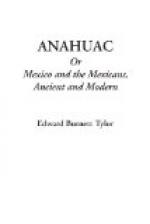Our canoe took us back to the Promenade of Las Vigas, which is a long drive, planted with rows of trees, and extends along the last mile or two of the canal. Indeed, its name comes from the beam (Viga) which swings across the canal at the place where the canoes pay toll. This was the great promenade, once upon a time; but the new Alameda has taken away all the promenaders to a more fashionable quarter, except on certain festival days, three or four times in the year, when it is the correct thing for society to make a display of itself—on horseback or in carriages—in this neglected Indian quarter. We had happened upon one of these festival days; so, as we crawled along the side-path, tired and dusty, we had a good opportunity of seeing the Mexican beau monde. The display of really good carriages was extraordinary; but it must be recollected that many families here are content to live miserably enough at home, if they can manage to appear in good style at the theatre and on the promenade. This is one reason why so many of the Mexicans who are so friendly with you out of doors, and in the cafes, are so very shy of letting you see the inside of their houses. They say, and very likely it is true, that among the richer classes, it is customary to put a stipulation in the marriage-contracts, that the husband shall keep a carriage and pair, and a box at the theatre, for his wife’s benefit. The horsemen turned out in great style, and the foreigners were fully represented among them. It was noticeable that while these latter generally adopted the high-peaked saddle, and the jacket, and broad-brimmed felt hat of the country, and looked as though the new arrangements quite suited them, the native dandies, on the other hand, were prone to dressing in European fashion, and sitting upon English saddles—in which they looked neither secure nor comfortable.
We walked home past the old Bull-ring, now replaced by a new one near the new promenade, and found, to our surprise, that in this quarter of the town many of the streets were under water. We knew that the level of the lake of Tezcuco had been raised by a series of three very wet seasons, but had no idea that things had got so far as this. Of course the ground-floors had to be abandoned, and the people had made a raised pathway of planks along tho street,




